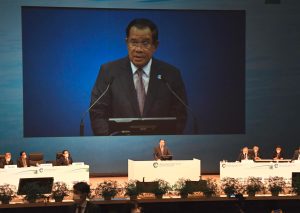Japan has traditionally played a deft if quiet diplomatic hand but recently elected Prime Minister Kishida Fumio has raised his country’s voice in Cambodia with a flurry of exchanges designed to counter Chinese influence and improve Phnom Penh’s international standing.
The groundwork began in February when Hun Manet, the eldest son of Prime Minister Hun Sen, made a trip to Tokyo where he presented his credentials as politician, military commander, and nominated successor to his father.
At home, the official press praised the visit but the Japan Times saw it differently, saying that Hun Manet was told that Japan wants next year’s general election to be held in a democratic way – a difficult task given the rounding up and prosecution of his father’s critics.
A month later, Hun Sen hosted Kishida, with potential funding and improved ties with the West also on the agenda. Yet another difficult ask, but necessary given the state of Cambodia’s economy amid the pandemic and an end to China’s blank check largess.
Access to Western money has not been helped by Hun Sen’s ability to tick-off the Americans over issues ranging from Beijing’s access to military bases on the south coast to dodgy interpretations of history and accusations that Washington has backed opposition attempts to oust him.
An additional reality is that Western countries simply don’t care about Cambodia the way they did when a 30-year civil war and extreme poverty reduced this country to a failed state and prompted the arrival of United Nations peacekeepers and massive financial aid.
The Cold War is long over, the Khmer Rouge tribunal has all but ended, and Western businesses were sidelined by Chinese investors in the late 2010s, while Cambodian living standards have improved to the point where tax collectors should enable the government to stand on its own two feet.
In short, Hun Sen’s influence in the West has waned almost to the point of no return and that’s why Japan and its traditional role as a bridge between East and West is re-emerging under Kishida, who took office last September.
On the sidelines of the 4th Asia-Pacific Water Summit, held last weekend in Kumamoto City, Hun Sen asked Japan to upgrade bilateral relations to “comprehensive strategic partnership,” a proposal which Kishida reportedly said he would consider.
It’s the type of partnership that Australia, among others, enjoys with Japan. For Cambodia, this could open up markets, provide military training, and open access to education, more money, and a higher standing on the diplomatic circuit.
In the meantime – apart from expectations for next year’s elections – Kishida wants Cambodia’s support for his stance against Moscow’s invasion of Ukraine and the restoration of democracy in Myanmar, in addition to backing for peace initiatives on the Korean peninsula and in the disputed the South China Sea.
Hun Sen’s opposition to the Ukrainian invasion has been loud and Cambodian trade deals with South Korea have long surpassed any lingering sympathies for North Korea which were cultivated over the last half of the 20th century by the former monarch Norodom Sihanouk.
But Hun Sen has been sharply rebuked for using his year as chair of ASEAN to legitimize the military coup in Myanmar and anything to do with the South China Sea gets messy, real messy, given Phnom Penh’s cozy relationship with Beijing.
Japan has also upped the ante with Russia.
On the eve of Hun Sen’s request at the water summit Japan’s foreign ministry issued a statement and for the first time in 20 years it clearly stated that four of its disputed islands remain “illegally occupied” by Russia, a legacy of World War II.
In decision making, Tokyo is notoriously slow and negotiations over what a “comprehensive strategic partnership” entails will be arduous, require a deep rethink on Cambodia’s foreign policy front, and take three to five years to finalize.
Given Hun Sen’s succession plans, the end result must fall on the shoulders of Hun Manet and that means next year’s election – which only Hun Sen can win – will still prove pivotal in defining this country’s place in the region for years to come.
































